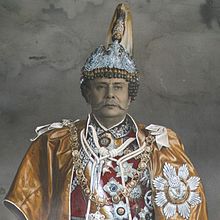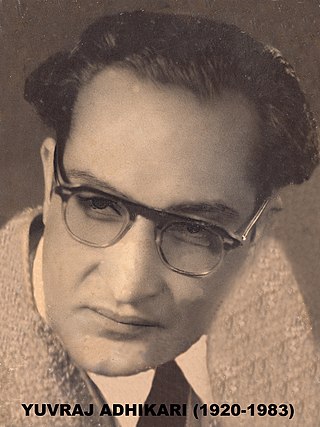Aftermath

The Biratnagar Jute Mill Strike (Majdur Hartal) of March 1947 was a labor strike in Biratnagar, Nepal, by workers and laborers of Biratnagar Jute Mill, Ltd. The strike was initially part of a dispute between mill workers and management regarding labor rights, but gradually the strike grew into a nationwide anti-regime movement.
According to the mill workers, living and working conditions in the mill were extremely poor, with no labor rights and no running water in living quarters. [1]
The demonstration started on March 4, 1947 [2] under the leadership of Girija Prasad Koirala, along with Tarini Prasad Koirala, Man Mohan Adhikari, and Yuvaraj Adhikari, as employees in the mill. [3] The strike was launched with initial demands purely based on labor rights, but later the workers also demanded political trade union rights. The Nepali Congress supported the strike at Biratnagar. [4] On March 9, Bishweshwar Prasad Koirala [2] joined the strike with his supporters and the strike grew in number. The Rana dynasty regime sent state troops to Biratnagar to put down the strike. [5] The strike ended when the troops reached Biratnagar after they arrested the leaders. Some of these leaders escaped capture by fleeing to India. Six National Congress leaders (Bishweshwar Prasad Koirala, Girija Prasad Koirala, Tarini Prasad Koirala, Gehendrahari Sharma, Manmohan Adhikari and Yubaraj Adhikari) were walked to Kathmandu as prisoners. The Nepali Congress held a conference in Jogbani, India and resolved to initiate a nationwide Satyagraha, or civil disobedience movement. [6] Thus, the countrywide anti-Rana demonstration started.


The Nepali Congress is a social democratic political party in Nepal and the largest party in the country. The party has 870,106 members as of the party's 14th general convention in December 2021, making it the largest party by membership in Nepal. In June 2023, the party started online membership since the emergence of youth leaders in vital posts to attract youths to the party. The party is led by former prime minister, Sher Bahadur Deuba since the party's thirteenth general convention in 2016. The party won 89 seats in the 2022 general election and is currently the largest parliamentary group in the House of Representatives.

Nepal Ratna Girija Prasad Koirala, affectionately known as Girija Babu, was a Nepalese politician. He headed the Nepali Congress and served as the Prime Minister of Nepal on four occasions: from 1991 to 1994, 1998 to 1999, 2000 to 2001, and 2006 to 2008. He was the Acting Head of State of Nepal between January 2007 and July 2008 as the country transitioned from a monarchy to a republic.

Man Mohan Adhikari (Magi) (Nepali: मन मोहन अधिकारी; 9 June 1920 – 26 April 1999) was the 31st Prime Minister of Nepal from 1994 to 1995, representing the Communist Party of Nepal (Unified Marxist-Leninist). He was the first communist Prime Minister in Nepal and one of the first communist politician in the world to be democratically elected as a head of government.

Bishweshwar Prasad Koirala, better known as B. P. Koirala, was a Nepali revolutionary, political leader, and writer. He was the Prime Minister of Nepal from 1959 to 1960. He led the Nepali Congress, a social democratic political party. He was the grandfather of Bollywood actors Manisha Koirala and Siddharth Koirala, the elder brother of former prime minister Girija Prasad Koirala and the younger brother of former prime minister Matrika Prasad Koirala.

Biratnagar is a metropolitan city in Nepal, which serves as the capital of Koshi Province. With a Metropolitan Urban Agglomeration population of 244,750 as per the 2021 census, it is the largest city and fastest growing city in the province and also the headquarters of Morang district. As per the preliminary report of 2022 Nepal census, Biratnagar Metropolitan has an estimated city population of 243,927 excluding the suburban areas which are now very well connected to the old town. It is the administrative center of the Greater Birat Development Area which incorporates the cities of Biratnagar and its suburbs and towns of-Itahari-Gothgau-Biratchowk-Dharan primarily located on the Koshi Highway in Eastern Nepal, with an estimated total urban agglomerated population of 804,300 people in 159,332 households including the town of Ithari. Biratnagar is located 399 km (248 mi) east of the capital, Kathmandu, and 6 km (3.7 mi) north of the bordering town of Jogbani in the Indian state of Bihar which is very well connected through Rani Path and Koshi Path. It is one of the major entry point in Nepal for Businessmen as well as Tourists who come to visit Nepal for various purposes. A customs duty is required to be paid for Indian vehicles in Nepal and Vice-versa.

Koirala is a common surname among upadhayay Brahmin and Chettri in Nepal and some parts of northeast India, All Koiralas belong to same family, having one ancestor. All Koiralas share the same gotra, Moudgalya.They are one of the prominent high-class families of Nepal, having produced four Prime Ministers from the same family over almost two decades.They played a significant role in restoring the monarchy, abolishing the rana regime, and contributing to Nepal's transition to democracy giving first people elected Prime-Minister, Bishweshwar Prasad Koirala.
Krishna Prasad Koirala was a Nepali politician, activist and social worker. He was the founder of the prominent Koirala family. Three of his sons became prime ministers of Nepal.

Subarna Shamsher Rana was a leading figure in the movement to overthrow the ruling Rana oligarchy and to establish democracy in Nepal. He was one of the three leaders of the Nepali Congress in the late 1940s, opposing his relatives, the Rana family, who held power in Nepal at the time.
Koirala family is one of the most prominent political families of Nepal. Krishna Prasad Koirala, a Rana-era socio-political activist, was exiled to Bihar, India by then Prime Minister Maharaja Chandra Sumsher. Four members of the family, including three brothers and their maternal cousin Sushil Koirala, have been Prime Ministers of Nepal.

Matrika Prasad Koirala was the Prime Minister of Nepal for two separate terms from 16 November 1951 to 14 August 1952 and again from 15 June 1953 to 11 April 1955.

General elections were held in Nepal from 18 February to 3 April 1959 to elect the 109 members of the first House of Representatives, the lower house of the Parliament of Nepal. They were held under the provisions of the 1959 constitution, which had been adopted on 12 February. More than 4.25 million people out of an overall population of about 8.55 million (1954) were eligible to vote. Voter turnout was 42.18%.

Yuvaraj Adhikari (1920-1983) was a Nepalese politician belonging to the Nepali Congress Party (NCP). He was in the forefront of the leaders who took part in 1947 Biratnagar jute mill strike along with Girija Prasad Koirala, Tarini Prasad Koirala, Man Mohan Adhikari He was among the six National Congress leaders i.e. Bishweshwar Prasad Koirala, Girija Prasad Koirala, Tarini Prasad Koirala, Gehendrahari Sharma, Manmohan Adhikari who were taken to Kathmandu as the prisoners of conscience from Biratnagar via the land routes. It took 24 days for them to reach Kathmandu on foot, and was jailed at a Sundarijal-based prison after completing the walk. He was in active role in and after abolition of Rana rule. Later he was arrested and imprisoned by King Mahendra following the 1960 royal coup. Upon his release, Adhikari, was exiled to India along with other leaders and workers of the party and returned home following a government to grant him amnesty. He was then involved in underground politics to abolish the Panchayati regime.

The revolution of 1951 in Nepal, also referred to as Sat Salko Kranti, was a political movement against the direct rule by the Rana dynasty of Nepal which had lasted for 104 years.
Prasad is an Indian name, used both as a personal and family name.
Tarini Prasad Koirala was a Nepalese journalist, writer, and politician belonging to the Nepali Congress Party.
Biratnagar Jute Mill is the biggest and oldest jute mill in Nepal. It was established under Prime Minister Juddha Shamsher Rana in 1936 A.D. The mill was initially run by the Government but later handed over to a private company for operation. The mill has a history of shutting down multiple times due to political situation. The mill is mostly remembered for initiating the democracy movement against the Rana dynasty in Nepal. The mill is also a tourist attraction for locals due to its long history.

Nepali National Congress was a political party in Nepal that was founded in 1947. The party was founded to protest the Rana rule in Nepal. Dilli Raman Regmi, B. P. Koirala, Matrika Prasad Koirala, Ganesh Man Singh, Krishna Prasad Bhattarai, Mahendra Narayan Nidhi were founding members of the party.